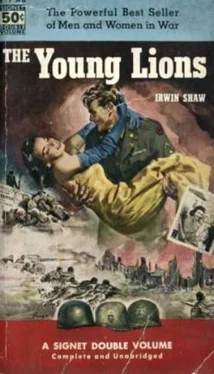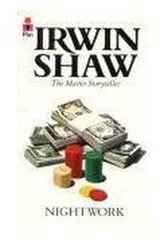Irwin Shaw - The Young Lions
Здесь есть возможность читать онлайн «Irwin Shaw - The Young Lions» весь текст электронной книги совершенно бесплатно (целиком полную версию без сокращений). В некоторых случаях можно слушать аудио, скачать через торрент в формате fb2 и присутствует краткое содержание. Жанр: Классическая проза, на английском языке. Описание произведения, (предисловие) а так же отзывы посетителей доступны на портале библиотеки ЛибКат.
- Название:The Young Lions
- Автор:
- Жанр:
- Год:неизвестен
- ISBN:нет данных
- Рейтинг книги:4 / 5. Голосов: 1
-
Избранное:Добавить в избранное
- Отзывы:
-
Ваша оценка:
- 80
- 1
- 2
- 3
- 4
- 5
The Young Lions: краткое содержание, описание и аннотация
Предлагаем к чтению аннотацию, описание, краткое содержание или предисловие (зависит от того, что написал сам автор книги «The Young Lions»). Если вы не нашли необходимую информацию о книге — напишите в комментариях, мы постараемся отыскать её.
The Young Lions — читать онлайн бесплатно полную книгу (весь текст) целиком
Ниже представлен текст книги, разбитый по страницам. Система сохранения места последней прочитанной страницы, позволяет с удобством читать онлайн бесплатно книгу «The Young Lions», без необходимости каждый раз заново искать на чём Вы остановились. Поставьте закладку, и сможете в любой момент перейти на страницу, на которой закончили чтение.
Интервал:
Закладка:
Slowly, standing close to each other, in a corner of the little station, hidden from most of the people on the platform, she told him. She didn't tell him about Frederick, but about the singing the night before and the Nazi toasts, and that she couldn't stay there for another day, no matter what. Joseph kissed her forehead absently and stroked her cheek. His face lost the gaiety it had had when he got off the train. The fine bones of his cheeks and jaw suddenly showed sharp and hard under the skin, and his eyes looked sunken and deep as he spoke to her. "Ah," he said, "here, too. Indoors, outdoors, city, country…" He shook his head. "Margaret, Baby," he said gently, "I think you had better get away from Europe. Go home. Go back to America."
"No," she said, letting it come out, without thinking about it. "I want to stay here. I want to marry you and stay here."
Joseph shook his head, the soft, closely cropped hair, greying a little, glistening where some drops of melting snow had fallen on it. "I must visit America," he said softly. "I must visit the country that produces girls like you."
"I said I want to marry you." Margaret held his arms tight and hard.
"Some other time, Sweet," Joseph said tenderly. "We'll discuss it some other time."
But they never did.
They went back to Langermans', and had a huge breakfast, sitting quietly before a sparkling, sunny window, with the Alps a majestic background for the bacon and eggs and potatoes and pancakes and Viennese coffee, with globs of whipped cream. Frederick waited on them, discreetly and politely. He held Margaret's chair when she sat down and was quick to refill Joseph's cup when it was empty.
After breakfast Margaret packed, and told Mrs Langerman that she and her friend had to leave. Mrs Langerman clucked and said, "What a shame!" and presented the bill.
There was an item on the bill of nine schillings.
"I don't understand this," Margaret said. She was standing at the shiny oak desk in the lobby as she pointed out the neatly inked entry on the bill. Mrs Langerman, bobbing, starched and brilliantly scrubbed, behind the desk, ducked her head and peered near-sightedly at the piece of paper.
"Oh." She looked up and stared without expression at Margaret. "Oh, that's for the torn sheet, Liebchen."
Margaret paid. Frederick was helping with her bags. She tipped him. He bowed as he helped her into the cab and said, "I hope you have enjoyed your visit."
Margaret and Joseph left their bags at the station and walked around, looking at the shops until it was time to get their train.
As the train pulled out she thought she saw Diestl, graceful and dark, at the end of the platform, watching. She waved, but the figure didn't wave back. Somehow though, she felt it would be like him to come down to the station and, without even greeting her, watch her go off with Joseph.
The inn Diestl had recommended was small and pretty, and the people charming. It snowed two of the three nights and there was fresh cover on the trails in the morning. Joseph had never been gayer or more delightful. Margaret slept secure and warm, with his arms around her all night, in the huge feather bed that seemed to have been made for mountain honeymoons. They didn't talk about anything serious, and they didn't mention marriage again. The sun shone in the clear sky over the peaks, all day long, every day, and the air was winey and intoxicating in the lungs. Joseph sang Schubert lieder for the other guests in front of the fire at night, his voice sweet and searching. There was a smell of cinnamon always in the house. Both of them were burned a deep brown, and more freckles than ever before came out on her nose. Margaret found herself crying when she went down to the station on the fourth day because they had to get back to Vienna. The holiday was over.
CHAPTER TWO
IN New York City, too, the shining new year of 1938 was being welcomed. The taxicabs were bumper to bumper in the wet streets, their horns swelling and roaring, as though they were all some newly invented species of tin-and-glass animal, penned in the dark stone and concrete. In the middle of the city, trapped in the glare of the advertising signs, like prisoners caught by the warden's floodlights in the moment of attempted flight, a million people, clamped together, rolled slowly and aimlessly, in pale tides, uptown and downtown. The electric sign that jittered nervously around the Times building announced to the merrymakers below that a storm had destroyed seven lives in the Mid-West, that Madrid had been shelled twelve times at the turn of the year, which, conveniently for the readers of the Times, came several hours earlier to Madrid than it did to the city of New York.
The celebrants themselves, pushing lava-like and inexorable through the paper slush underfoot, threw confetti at each other, laden with the million germs of the city's streets, blew horns to tell the world that they were happy and unafraid, shouted hoarse greetings with thin good-nature that would not last till morning. They had come from the fogs of England for this, the green mists of Ireland, the sandhills of Syria and Iraq, from the pogrom-haunted ghettoes of Poland and Russia, from the vineyards of Italy and the cod-banks off Norway, and from every other island, city and continent on the face of the earth. Later, they had come from Brooklyn and the Bronx, and East St. Louis and Texarkana, and from towns called Bimiji and Jaffrey and Spirit, and they all looked as though they had never had enough sun or enough sleep; they all looked as though their clothes had originally been bought for other people; they all looked as though they had been thrown into this cold, asphalt cage for someone else's holiday, not their own; they all looked as though deep in their bones they understood that winter would last for ever, and that, despite the horns and the laughter and the shuffling, religious promenade, they knew that 1938 would be worse than the year before it.
Michael Whitacre pushed his way through the crowds. He felt himself smiling mechanically and hypocritically at people as they jostled him. He was late, and he couldn't get a taxi, and he hadn't been able to avoid staying and having some drinks in one of the dressing-rooms. The hurried gulping had left his head buzzing and his stomach burning.
The theatre had been wild. There had been a noisy, uninterested audience and an understudy had filled in the grandmother's part because Patricia Ferry had shown up too drunk to go on, and Michael had had a trying night keeping everything going. He was the stage manager for Late Spring and it had a cast of thirty-seven, with three children who always got. colds, and five sets that had to be changed in twenty seconds. At the end of a night like this all he wanted to do was to go home and sleep. But there was this damned party over on 67th Street, and Laura was there. Anyway, nobody ever just went to sleep on New Year's Eve.
I must get a home in the country, he thought as he walked briskly, his shoes making a soft tapping on the cement, a little inexpensive place not far from the city, six, seven thousand, maybe, you could swing a loan, where I can get away for a few days at a time, where it's quiet and you can see all the stars at night and where you can go to sleep at eight o'clock when you feel like it. I must do it, he thought, I mustn't just think about it.
He got a glimpse of himself in a dimly lit shop window. He looked shadowy and unreal in the reflection, but, as usual, he was annoyed with what he saw. Self-consciously he straightened his shoulders. I must remember not to slouch, he thought, and I must lose fifteen pounds. I look like a fat grocer.
He refused a taxi that stopped next to him, as he crossed at a corner. Exercise, he thought, and no drinking for at least a month. That's what does it. The drinking. Beer, martinis, have another. And the way your head felt in the morning. You weren't good for anything until noon and by that time you were out to lunch and there you were with a glass in your hand again. This was the beginning of a new year, a wonderful time to go on the wagon. It would be a good test of character. Tonight, at the party. Unobtrusively. Just not drinking. And in the house in the country no liquor closet at all. He felt much better now, resolved and powerful, although his dress trousers still felt uncomfortably tight as he strode past the rich windows towards 67th Street.
Читать дальшеИнтервал:
Закладка:
Похожие книги на «The Young Lions»
Представляем Вашему вниманию похожие книги на «The Young Lions» списком для выбора. Мы отобрали схожую по названию и смыслу литературу в надежде предоставить читателям больше вариантов отыскать новые, интересные, ещё непрочитанные произведения.
Обсуждение, отзывы о книге «The Young Lions» и просто собственные мнения читателей. Оставьте ваши комментарии, напишите, что Вы думаете о произведении, его смысле или главных героях. Укажите что конкретно понравилось, а что нет, и почему Вы так считаете.











